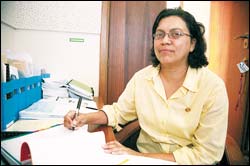Educational units under review
29 March 2004
Best practice: Colette February, quality assurance manager for the Institutional Planning Department.
All departments and programmes at UCT are being asked to participate in five-yearly Academic Reviews as part of the university's ongoing commitment to quality assurance.
Several of these reviews have already been completed and more are planned for 2004.
Ultimately, these reviews will feed into the work of the Higher Education Quality Committee (HEQC), which has the task of auditing all higher education institutions in South Africa. UCT is scheduled to have its first HEQC audit early in 2005.
The model chosen for UCT emphasises self-evaluation and development, placing much responsibility for the quality assurance process in the hands of academics themselves.
According to the Quality Assurance Working Group, the intention is to produce "balanced accounts which acknowledge strengths as well as areas of real difficulty, and which then initiate developmental processes to address these difficulties".
In addition, by making issues and problems of academic practice more visible and clearly understood, the university will enhance its control over the professional environment. The review process consists of three broad phases:
- Self-review, culminating in a self-review portfolio;
- Formal review conducted by the appointed review team, culminating in a review report, and
- Follow-up action flowing from recommendations in the report.
In addition, the university is drawing on the tried-and-tested mechanism of peer-review by adapting its external examiner system to make up the formal review teams.
Ultimately, faculties will be expected to develop a schedule of reviews of academic units across a five-year cycle, ensuring that every unit of educational delivery is formally reviewed once in the cycle.
Quality assurance manager for the institutional planning department, Colette February, is the person responsible for setting up the individual Academic Reviews involving outside adjudicators.
February commented: "Just as the university has committed itself to a process of internal academic reviews as a way of making best-practice visible across the university spectrum, and facilitating a conversation of improvement and reflection in key respects, the Institutional Planning Department has committed itself to identical processes.
"This requires consistent evaluation and improvement of the kinds of support we offer the university with regard to academic reviews.
"We have reflected on information obtained from last year's Academic Reviews sent to all units under review and chairs of formal review panels, and have incorporated much of the feedback into improving this year's Guidelines for Academic Review document, as well as logistical processes concerning the review period itself."
DVC Professor Martin Hall believes that Academic Reviews reflect a basic principle of university life, namely peer-review.
"The new approach we're following recognises that circumstances have changed and that the university has a more complicated structure than it used to have, so the process has been designed to respond to that.
"The heart of the process still remains peer-review, by other academics within the university and with their colleagues from other institutions.
"The second key point is that this is not a punitive exercise but a developmental exercise. The reviews all start with a self-assessment of their own objectives and where they stand in relation to those objectives.
"This creates very important opportunities for departments to start a conversation with their colleagues, dean and executives, about where they are going with their programmes.
 This work is licensed under a Creative Commons Attribution-NoDerivatives 4.0 International License.
This work is licensed under a Creative Commons Attribution-NoDerivatives 4.0 International License.
Please view the republishing articles page for more information.










